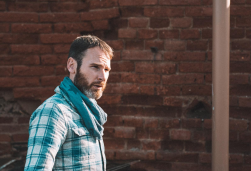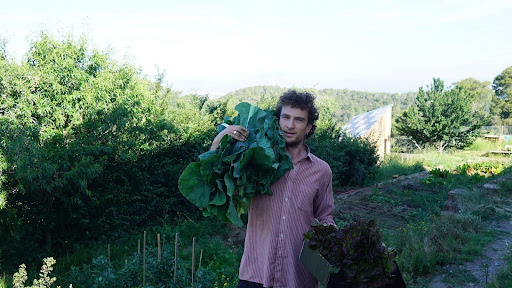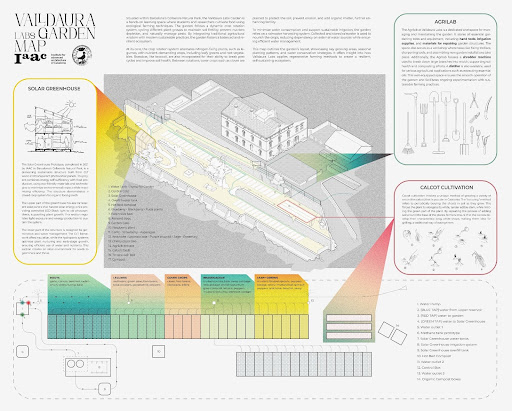Syllabus⇝
The course combines theory and practice to establish an intensive organic agriculture farm at Valldaura Labs. We will explore what it takes to plan and implement a self-sufficient garden, whilst reflecting on how these techniques can be applied to other urban and rural contexts. Agriculture is inseparable from any living system, settlement or city, and the ways we integrate and shape our food systems also shapes the way we choose to live. Over the centuries, the agricultural industrial sector has grown to become a force for ecological and climate change. How we adapt methods of landscape development for the production of food and material resources is now one of the most contested debates of our time.
The ecological interactions seminar line, although highly practical, also examines what emerging techniques and infrastructure can be designed to be appropriate for climate resilient societies, productive enough for global markets whilst being ecologically regenerative rather than reductive. The Valldaura landscape and gardens offer a unique opportunity for innovation where tacit knowledge of plant and ecosystem development combines with new computational and digital tools. Together we can enhance knowledge and practice towards an ecological optimum for agricultural systems. The objective is for students and researchers to gain practical, hands-on experience of farm life as well as an understanding of past philosophies and future practices. Part of the Valldaura living lab.
The course considers the types of practices involved in Agro-ecology and challenges us to design, cultivate and elaborate new micro-industries, and to produce new materials and supply chains. Whilst practical and hands-on, a general botanic theory will guide the development and investigation of agricultural and ecological systems. Traceability in nutrient flows, energy, materials and labor costs will be mapped and recorded from farm to fork and from below ground to above ground.
Learning Objectives⇝
The student will:
- Acquire an understanding of various historical and changing paradigms of farming, as well as their underlying philosophies and theories.
- Gain an experiential understanding of day-to-day farming activities, whilst recording tooling techniques, observations, and best practices.
- Monitor and record the varied flows of inputs and outputs, through both tacit knowledge, direct observation, and the use of digital monitoring equipment for traceability.
- Propose and record planting strategies for resilient agriculture and make hypotheses about polyculture planting, rotation schedules, their design, costs, and benefits.
- Study the development of a single garden variety in relation to its physiological conditions in depth.
- Investigate methods of food preparation and preservation to manage crop yields in a self-sufficient garden.
- Evaluate the impact of new technologies towards computational agriculture.
Schedule⇝
Faculty: Jon Minchin, Olly Needham
Faculty: Jon Minchin, Olly Needham
Faculty: Jon Minchin, Olly Needham
Faculty: Jon Minchin, Olly Needham
Deliverables⇝
The course deliverables will be outlined by the faculty during the first joint session on October 14th.
Faculty⇝

Jonathan Minchin studied Fine Arts and Design Craftsmanship and digital Fabrication. He attained BA in Architecture and a masters degree MSC in ‘International Cooperation, Sustainable Emergency Architecture’ in 2010. He is coordinator of the EU funded research project called ROMI (Robotics for Microfarms) and has spoken at the European Commission and British Parliament.
In this field he has worked on housing and development projects alongside ‘Habitat for Humanity’ in Costa Rica, ‘UNESCO’ in Cuba and with ‘Basic Initiative’ in Tunisia.
He has worked in conjunction with ‘UN-Habitat’ in Barcelona and holds a particular interest in appropriate technology, bioregional industries and agroecology. His professional career has focused on architectural and urban development projects with Architects Offices in both England and Spain and his writing on “Geographic referencing for Technology Transfer” was published in the book “Reflections on Development and Cooperation” in 2011. He took part in the Fab Academy, Bio Academy and Coordinated the Green Fab Lab and Valldaura campus between 2012 and 2017.
Jonathan has also worked on the on the DIYBio Barcelona project.

Olly Needham
Designer with a specialism in natural material building and digital fabrication
After 9 years in the design industry, he shifted his focus to Ecological Building and is a graduate of the MAEBB 2023-24 program. An alumni of the Ellen Macarthur foundation ‘From Linear to Circular’ program, Olly has collaborated with a variety of community growing and making projects, bringing his interests of growing, food, circular production systems, design, natural building and community engagement together. Olly is actively working in the Urban Agriculture network of Barcelona; designing and maintaining vertical, irrigated gardens in various locations in the city.
Olly will play an active role in the day-to-day management of the grow spaces at Valldaura labs, advancing the self-sufficiency of food within our community and connecting students to the produce they will grow, manage and prepare.
